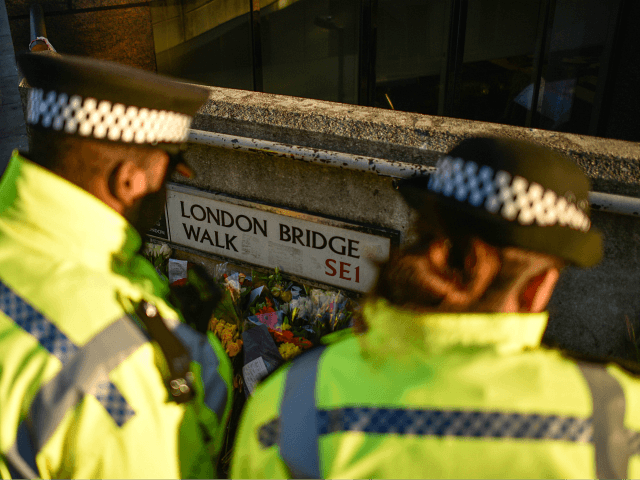An inquest has found that London Bridge terror attack victims Saskia Jones and Jack Merritt were unlawfully killed and that failures by probation services, police, and British domestic intelligence agency MI5 contributed to their deaths.
Radical Islamic terrorist Usman Khan fatally stabbed Jones and Merritt in November 2019 at Fishmongers’ Hall in London Bridge while the Oxford University graduates were facilitating a prison rehabilitation event that the convicted terrorist was attending.
Following a seven-week inquiry, a jury ruled that there had been an unacceptable level of accountability by authorities in the management of Khan, who committed the attack just 11 months following his early release from prison. He had been in prison for his part in a plot to bomb the London Stock Exchange and for planning to form a terrorist training camp in Pakistan.
Failures include agencies responsible for monitoring the terrorist not sharing information, allowing Khan to travel to London by himself, and security failures at the Learning Together event at Fishmongers’ Hall itself, the BBC reported on Friday.
Khan’s trip from Staffordshire to London was his first time unaccompanied since he left prison. Police, MI5, and the probation services were aware of that fact, but not one of those agencies took any measures.
Miss Jones’s family had remarked that it was “beyond understanding and astonishing that not one of the state agencies sufficiently considered the associated risk and therefore questioned the wisdom of sending Usman Khan unaccompanied to London”.
Authorities Suspected Terrorist Might Commit Attack Before Prison Release https://t.co/axM4DH8KRg
— Breitbart London (@BreitbartLondon) April 23, 2021
During his time in prison, Khan had been rated a high-risk inmate and deemed more dangerous on his exit from prison than when he had entered it eight years before. MI5 put Khan under investigation while he was still in prison and monitored him for more than four years.
Earlier this month, the inquest heard that MI5 had received intelligence in 2018 that the convicted terrorist could return to his “old ways” and may even carry out a terror attack. But the information relating to the potential for committing an attack had not been handed on to the Multi Agency Public Protection Arrangements (MAPPA) panel, which managed Khan.
Following Khan’s release from prison, MI5 carried out two assessments and ruled, wrongly, that he was not a threat for committing a lone attack.
The jury also condemned authorities for having a “blind spot to Khan’s unique risks due to [the] ‘poster boy’ image” at Learning Together and the lack of psychological assessments post-release.
It also ruled that there was a “lack of communication and accountability, inadequate consideration of key guidance between parties” related to the Learning Together event and that there were “serious deficiencies in the management of Khan by Mappa and the failure to complete event-specific risk assessments by any party”.
Concern had also been raised regarding his behaviour before the event, in that Khan had become withdrawn and had failed to find a job.
Metropolitan Police Service Assistant Commissioner Neil Basu accepted the force’s failures, describing them as “simply unacceptable”, continuing that he was “so deeply sorry”.
It is not clear whether anyone will actually be held personally accountable at this time, however.
London Bridge killer Usman Khan was a convicted terrorist released from prison after judges changed his "public protection" sentence. Public protection sentences were scrapped by the Tories and deemed unlawful in a European court ruling. https://t.co/p5wfe2BhUK
— Breitbart London (@BreitbartLondon) November 30, 2019
This is not the first inquiry after a deadly terror attack to find multiple failings at almost every level. An inquest into the 2017 Manchester Arena terror attack, where 22 victims died after a son of Libyan refugees detonated a suicide bomb as fans left an Ariana Grande concert, found that the Islamists had been flagged by security services 18 times before the attack and that they knew he was associating with known extremists — but did not reopen their investigation into him.
The police were also found to have made errors, including an officer taking an unauthorised two-hour dinner break, leaving the Arena unguarded and allowing Abedi, carrying a massive, suspicious backpack to walk straight into the venue without obstruction.
Manchester police were also alerted to deficiencies in their terror responses six months before the attack, but did not act on recommendations. Bad planning by emergency services also meant that firemen were left standing around at stations when they should have been dispatched to the terror attack to help save lives.
Security guards also failed to confront Abedi, who was acting oddly and praying in the foyer, despite concerns being raised by workers and members of the public, with one security official saying that he was afraid to approach the terrorist about his behaviour in case he was labelled a “racist”.
One steward, Mohammed Agha, told a concerned father who came to pick up his daughter from the concert, “‘Yeah, yeah we’ve seen him, he’s fine,’” 15 minutes before Abedi detonated his bomb.
MI5 Knew Manchester Bomber Had Visited Jihadist in Prison but Did Nothing https://t.co/Ribw7FWDCq
— Breitbart London (@BreitbartLondon) September 11, 2020
Follow Breitbart London on Facebook: Breitbart London

COMMENTS
Please let us know if you're having issues with commenting.